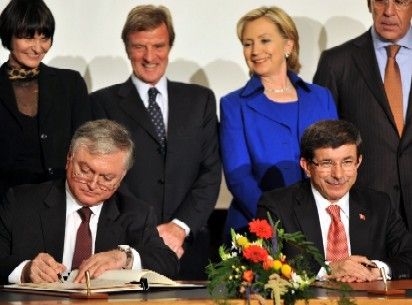News, Etc.
The difficulties lying ahead in Turkey’s opening to Armenia surfaced on October 10 in Zurich while the foreign ministers of the two countries were preparing to sign a protocol brokered by Switzerland.
The signing ceremony scheduled for 18.00 was delayed more than three hours when both ministers objected to the content of planned speeches to be made by their opposite number. Although no official explanation was made, press reports claimed that Edvart Nalbantyan, the Armenian foreign minister wanted to mention 1915 events as genocide in his speech which was found unacceptable by his Turkish counterpart Ahmet Davutoglu. Another point that Davutoglu objected in Nalbantyan’s speech was that the Armenian foreign minister wanted to underline that the protocol to be signed is not related to the Nagorno-Karabagh dispute with Azerbaijan.
Conversely, Nalbantyan objected to the part of Davutoglu’s speech where the Turkish foreign minister wanted to say that the protocol will be put into practice only after the solution of the Nagorno-Karabagh problem.
Nagorno-Karabagh is an Azeri territory occupied by Armenia since 1993. Turkey does not want to upset the Azeris by becoming too close to Armenia because of this issue.
Finally, U.S. Secretary of State Hillary Clinton mediated between the two ministers and convinced Nalbantyan to agree with Davutoglu’s offer to make no speeches at all.
Three hours later, the two ministers signed the protocol with grim faces as Clinton, Russian Foreign Minister Sergei Lavrov, French Foreign Minister Bernard Kouchner, Slovenian Foreign Minister Samuel Zbogar as the chairman of the EU Council of Ministers, the EU Commissioner Javier Solana, and the Swiss Foreign Minister Micheline Calmy-Rey watched them standing behind.
Azeri Foreign Ministry lost no time to react to the Turkey-Armenia protocol. In a written statement from Baku, it said the rapprochement between Turkey and Armenia before Armenia withdraws from occupied Azeri lands “is against the national interests of Azerbaijan.”
Erdogan: “We will never take a step that will cause unease in Azerbaijan”
Chatting with journalists in Istanbul while Hillary Clinton was spending efforts to defuse the situation in Zurich, Turkish Prime Minister Tayyip Erdogan said, “We will never take a step that will cause unease in Azerbaijan.
“Of course, the demands that will come from Armenia during the course of time are important. We cannot bend and twist according to all demands,” said Erdogan.
Erdogan also referred to the latest round of talks between Azeri President Ilham Aliyev and his Armenian counterpart Serzh Sarkisian in Kishinev, the capital of Moldova. “A positive step between Azerbaijan and Armenia would have contributed to this process but unfortunately they were able to make progress,” said Erdogan.
After the meeting in Kishinev on October 9, Aliyev said that the talks have been fruitless.
Obama’s wish
“We have already seen historic and courageous steps taken by Turkish and Armenian leaders. These contacts hold out the promise of a new day. An open border would return the Turkish and Armenian people to a peaceful and prosperous coexistence that would serve both of your nations. That is why the United States strongly supports the full normalization of relations between Turkey and Armenia.”
With these words U.S. President Barack Obama addressed the Turkish parliament in April during his first visit abroad after he moved into the White House in January.
Although, Turkey’s President Abdullah Gul had launched the ”opening” with Armenia by attending the World Cup qualification match between the national teams of both countries in Yerevan in September last year, Obama’s address, no doubt, gave additional impetus for speeding up the normalization process.
However, the central question in the Armenian opening, that is whether the border between the two countries will be opened or not, remains undecided.
After President Gul attended the match in Yerevan flanked by his Armenian counterpart Sarkisian, Prime Minister Tayyip Erdogan traveled to Baku, the capital of Azerbaijan to soothe the Azeri concerns that Turkey is making up with Armenia at the expense of Azerbaijan.
“The border will never open unless the Armenian occupation in Nagorno-Karabagh is lifted,” Erdogan assured the Azeris.
Now, the playoff for the Yerevan game will take place in Bursa on Oct.14 and Gul has invited Sarkissian to attend the event contributing to the thaw between the two countries. However, Sarkisian has repeatedly avoided committing himself to coming to Bursa.
“If the borders are opened and if we achieve important progress and arrive at the threshold of opening borders then I can go to Turkey,” the Armenian president said last month during an interview with the BBC.
In order for Turkey to open the border with Armenia, the Grand National Assembly in Ankara has to ratify the protocol signed in Zurich on October 10.
However, according to the Hurriyet newspaper, when President Gul had a summit meeting with Ilham Aliyev accompanied by their foreign ministers earlier in October, the Turkish side gave assurances to the Azeris that the protocol with Armenia will not be sent to the Turkish parliament as long as the Nagorno-Karabagh question is not solved. The newspaper adds that, the Turkish side’s assurances were found satisfactory by the Azeris.
Meanwhile Aliyev and Sarkisian held their fourth face-to-face meeting in the Moldavian capital of Kishinev under the auspices of the U.S. ambassador there only two days before the signing of the protocol in Zurich by the Turkish Foreign Minister Ahmet Davutoglu and his Armenian counterpart Edvart Nalbantyan.
The protocol stipulates that Turkey and Armenia will re-establish diplomatic relations which were cut off in 1993 because of hostilities between Armenia and Azerbaijan. It also foresees the opening of border gates within a two month period after the protocol goes into effect.
Both sides also agree that the thorny issue of 1915 events should be studied by an international team of impartial historians and scientists.
It is understood that the Turkish side will wait for the Azeri and Armenian presidents reach a tangible understanding over the Nagorno-Karabagh issue before debating the protocol in the Turkish parliament.
Opposition in Turkey against the protocol
Opposition parties in the Turkish parliament are criticizing the protocol with Armenia pointing out that this country has not dropped “its expansionist policies towards Turkey.” They are giving the example of Armenian constitution which refers to eastern Turkey as “Western Armenia,” and they object Armenia using the figure of Mount Ararat which is inside Turkey in its national seal.
Although Sarkisian said that Armenia will not insist on Turkey’s recognition of “1915 Armenian genocide,” it seems that this is not enough to appease the opposition in Turkey.
Armenian diaspora also against the protocol
There were demonstrations against Armenia’s decision to sign such a protocol with Turkey in almost all the cities where there are Armenian communities. Also in Yerevan people demonstrated against the protocol on grounds that the Armenian government is waiving its right to insist that Turkey should recognize its responsibility in the “Armenian genocide of 1915.”
After all these hurdles, it remains to be seen whether Sarkisian will come to Bursa on October 14 to watch the soccer game between Armenia and Turkey.

